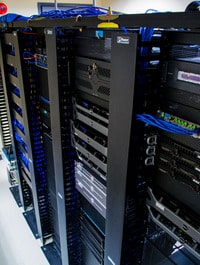
How Long Will This Server Last? A Basic Guide to the Shelf-Life of Your Organization’s Hardware

Technology equipment can be expensive, and many organizations try to get as much use out of their hardware as they can before replacing them, sometimes to their detriment. But how long should you really keep your equipment before the risk for failure and unplanned downtime becomes significant?
Here’s a basic guide to the lifespan of your equipment that you can follow when deciding what to upgrade and when. At Rocket IT, we recommend you replace your hardware in the lower end of the ranges given below to stay up and in the green. The closer to the end of the time range you go, the greater your risk of failure and data loss.
End-User Equipment/Services:
- Computers: Unless you really want to keep upgrading as new technology comes out, your laptop should remain functional for about three to five years with regular updates, patches, and upgrades.
- Monitors: The lifecycle of your monitors depends heavily on how often you use them and what kind you have. Your LCD monitor can last from 30,000 to 60,000 hours which will give you about ten to twenty years of use out of them if you use them around eight hours a day.
- Docking Station (if laptop): Docking stations don’t have moving parts (which is often what causes hardware failures), so they tend to last a long time. You’re more likely to need to upgrade your docking station because you’ve purchased a new laptop than you are because the old one ran through its shelf-life.
- External Mouse/Keyboard: Quality really does matter with your external mouse and keyboard if you want them to last. Cheap ones’ performance can start to decline after just a year with average use. Quality ones can last for over three years. All of this varies with how often you use your mouse and keyboard and how rough you are with them when you do.
- Personal Printer: Most desktop laser printers have an expected lifetime of about five years. The life expectancy of your printer depends heavily on how much you use it and on the conditions in which you do. Desktop printers in a cool office are more likely to last longer than those that run in a hot warehouse, for example. The average inkjet printer has a life expectancy of about four years.
- External hard drive: About 78% of drives last longer than four years. If you use your external drives regularly, they can last anywhere from one year to six. There are a lot of factors that can contribute to hard drive failure, so you should always be very careful to make sure you have backups (and sometimes redundancies).
- Desk phone and headset: Desk phones can last a good long time, and their headsets will last as long as the batteries last (if they have batteries). Headset batteries should last maybe three years. Most VOIP phone systems are hosted solutions now, so there’s no associated hardware to replace for the system itself.
Company-Wide Equipment/Services:
- Servers: The typical lifespan of your average server should be about three to five years, depending on how they’re used; however, you will want to pay close attention to the server’s software. When server software ages out, it becomes incredibly difficult to properly support and service the equipment itself. Pushing the longevity of your server makes you more susceptible to unplanned downtime and data loss.
- Copier: For regularly used standing copiers, you can expect to get about five years of use out of them. For the high-end copier and less frequently used ones, you can often use them for up to seven to ten years.
- Firewalls, Switches, & Wireless Access Points: Your typical firewall, access point, and switch last about five to eight years. Like a server, you will definitely want to replace it before waiting on its failure.
- UPS Devices (Uninterruptible Power Supplies): A UPS provides emergency power to your equipment when the main input power fails and protects your equipment from power surges. The battery of a UPS device can last about three years. The device itself typically lasts about four to six.



